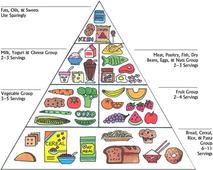Nutrition
What should you eat and drink to stay a healthy athlete
Carbohydrate is arguably the most important source of energy for athletes. No matter what sport you play, carbs provide the energy that fuels muscle contractions. Once eaten, carbohydrates breakdown into smaller sugars (glucose, fructose and galactose) that get absorbed and used as energy. Any glucose not needed right away gets stored in the muscles and the liver in the form of glycogen. Once these glycogen stores are filled up, any extra gets stored as fat.
Adequate carbohydrate intake also helps prevent protein from being used as energy. If the body doesn’t have enough carbohydrate, protein is broken down to make glucose for energy. Because the primary role of protein is as the building blocks for muscles, bone, skin, hair, and other tissues, relying on protein for energy (by failing to take in adequate carbohydrate) can limit your ability to build and maintain tissues. Additionally, this stresses the kidneys because they have to work harder to eliminate the byproducts of this protein breakdown.
Carbohydrates are also divided into simple and complex forms. Simple sugars (carbs) are absorbed and converted to energy very quickly and provide a rapid source of energy. Fruit is a good source of simple carbohydrates. Complex carbohydrates take a bit longer to be digested and absorbed into the body. They also take longer to breakdown and therefore provide energy at a slower rate than simple sugars. Examples of complex carbohydrates are breads, rice and pasta.
Starches and fibre
Starch and fibre are also considered complex carbohydrates, but fibre cannot be digested or used for energy. Starch is probably the most important energy source in an athlete’s diet because it is broken down and stored as glycogen. Foods high in starch include whole grain breads, cereals, pasta, and grains.
Storing Carbohydrate
One gram of carbohydrate provides four calories of energy. Athletes often talk about carbohydrate loading and carbohydrate depletion which refers to the amount of carbohydrate energy we can store in our muscles. This is generally around 2,000 carbohydrate calories, but we can change this number through depletion and loading. During depletion (from diet, exercise or a combination) we use up the stored carbohydrate.
Adequate carbohydrate intake also helps prevent protein from being used as energy. If the body doesn’t have enough carbohydrate, protein is broken down to make glucose for energy. Because the primary role of protein is as the building blocks for muscles, bone, skin, hair, and other tissues, relying on protein for energy (by failing to take in adequate carbohydrate) can limit your ability to build and maintain tissues. Additionally, this stresses the kidneys because they have to work harder to eliminate the byproducts of this protein breakdown.
Carbohydrates are also divided into simple and complex forms. Simple sugars (carbs) are absorbed and converted to energy very quickly and provide a rapid source of energy. Fruit is a good source of simple carbohydrates. Complex carbohydrates take a bit longer to be digested and absorbed into the body. They also take longer to breakdown and therefore provide energy at a slower rate than simple sugars. Examples of complex carbohydrates are breads, rice and pasta.
Starches and fibre
Starch and fibre are also considered complex carbohydrates, but fibre cannot be digested or used for energy. Starch is probably the most important energy source in an athlete’s diet because it is broken down and stored as glycogen. Foods high in starch include whole grain breads, cereals, pasta, and grains.
Storing Carbohydrate
One gram of carbohydrate provides four calories of energy. Athletes often talk about carbohydrate loading and carbohydrate depletion which refers to the amount of carbohydrate energy we can store in our muscles. This is generally around 2,000 carbohydrate calories, but we can change this number through depletion and loading. During depletion (from diet, exercise or a combination) we use up the stored carbohydrate.
What should you eat before exercising/competing
Suggested foods for exercise/eating before exercise is something only the athlete can determine based upon experience, but some general guidelines include eating a solid meal 4 hours before exercise, a snack or a high carbohydrate energy drink 2 to 3 hours before exercise, and fluid replacement 1 hour before exercise.
1 hour or less before competition
2 to 3 hours before competition
3 to 4 hours before competition
1 hour or less before competition
- fresh fruit such as apples, watermelon, peaches, grapes, or oranges and/or
- Energy gels
- up to 1 1/2 cups of a sports drink.
2 to 3 hours before competition
- fresh fruits
- bread, bagels, pasta
- yogurt
- water
3 to 4 hours before competition
- fresh fruit
- bread, bagels
- pasta with tomato sauce
- baked potatoes
- energy bar
- cereal with milk
- yogurt
- toast/bread with a bit of peanut butter, lean meat, or cheese
- water

